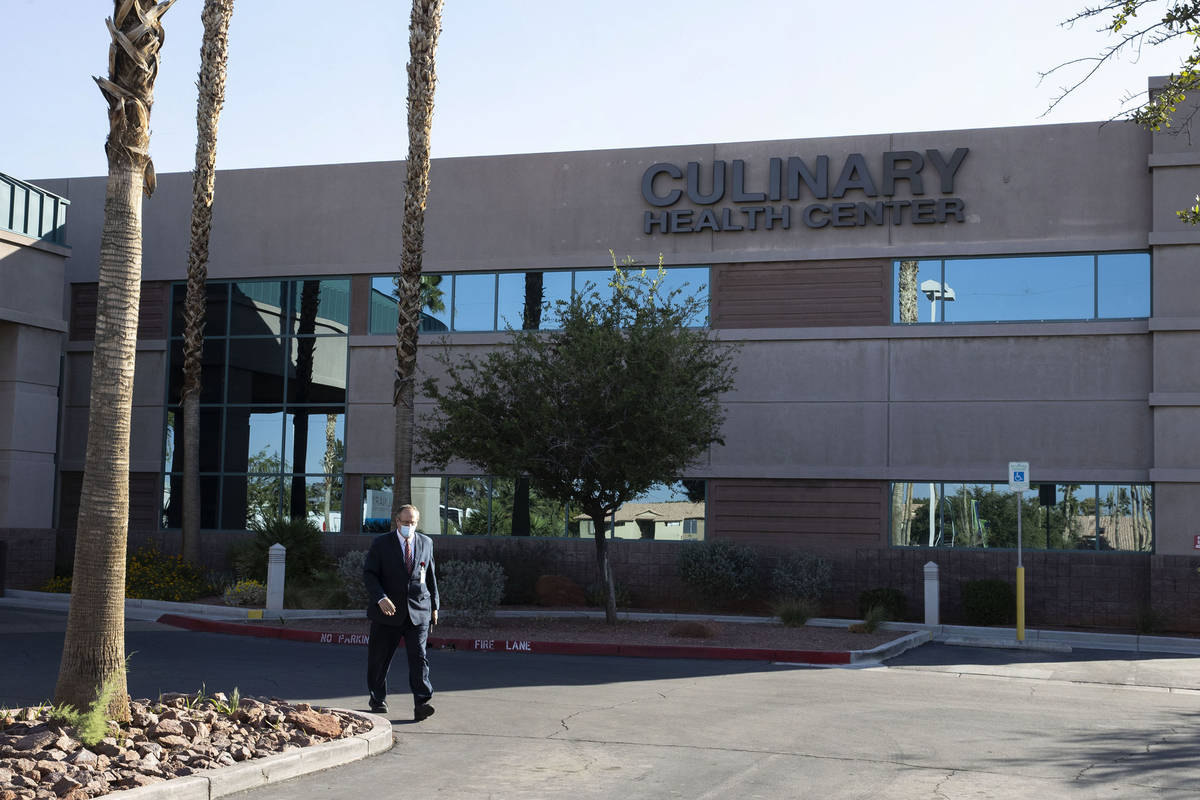Culinary Health Center closure causes concern though care continues

When it opened in June 2017, the Culinary Union’s $30 million health center was billed as a state-of-the art, one-stop shop for quality care at an affordable cost, offering primary, urgent, eye and dental care. It featured its own pharmacy and hospital grade lab and radiology services.
And it seemed to live up to the hype, receiving high approval ratings from the Culinary members working in Las Vegas hotel-casinos while becoming a regular stop for Democratic presidential candidates, who praised it as a model for better patient care.
Despite its success, the health center shut its doors in late April due to “extremely low usage rates during the shutdown and the ongoing pandemic,” said Bethany Khan, communications director for Culinary Union Local 226.
But some who worked at the center suggest that a medical crisis is when the center is needed the most.
“I think the timing was terribly unfortunate,” said Todd Phillips, who worked as a physician assistant and in administration at the center. “It was a missed opportunity, with shutting down, to help their membership through a crisis, and particularly when we’ve done such a good job in the preceding years providing access to a patient population that’s largely minorities, who generally have poor access to care.”
In advance of the closure, members were provided with information on where to fill prescriptions and how to access care, Khan said.
“No Culinary Health Center patient went without care during the shutdown as the Culinary Health Center provided and continues to provide tele-health support to patients,” she said.
Some services have been restored at the center with more to come. “We look forward to redesigning primary care and reopening soon,” Khan said, declining to give a more specific time frame.
It remains unclear, however, whether the same range of services, including urgent care, will be provided upon the full re-opening.
A new model
The 60,000 members of Culinary Local 226 in Las Vegas and Reno, the largest and most influential union in Nevada, include the housekeepers, cocktail and food servers, porters, bellmen, cooks, and laundry and kitchen workers at many properties on the Strip and in downtown Las Vegas.
The Culinary Health Fund, sponsored by the union and Las Vegas-area employers, provides health insurance coverage for 145,000 members and their dependents. Health fund representatives did not respond to requests for comment.
For the members, quality, affordable health care has long been a priority. The health center was several years in the making.
“The Culinary Health Center was a dream come true for Culinary Union members who have made family health care their highest priority for so many years,” Khan said.
Visits to the health center, on Nellis Boulevard near Bonanza Road, may have declined in part due to the layoffs and furloughs that decimated the ranks of hotel workers in Las Vegas. Half of the local union’s members are back on the job and half are still laid off, Khan said.
At least some laid-off workers still have Culinary health insurance. The union announced on Aug. 31 that insurance for workers laid off from MGM Resorts and Caesars would be extended until March in agreements covering 22 properties. Khan declined to say if insurance for other laid-off workers at other properties had been or would be extended.
The center’s future
The center has partially reopened, including the pharmacy and dental practice. Hundreds of members are getting primary care each week through tele-health visits, Khan said.
What members won’t find at the center is urgent care, which had been provided 24 hour a day, seven days a week. However, members continue to have access to comprehensive urgent care through the Culinary Health Fund network.
Before the closure, roughly 300 patients a day were seen for urgent care at the center, which offered radiology and laboratory services equivalent to those at acute-care hospitals, said Dr. Thomas Zyniewicz with US Acute Care Solutions, which operated the health center’s urgent care.
Before the closure, if, for example, a patient needed a CAT scan, he could get it at the center, rather than needing to be transferred to a hospital. The approach provided greater coordination of care at half of what it would have cost at a hospital, he said.
He believes that shifting this care to hospitals places a burden on the hospital system, which he expects to be especially strained this winter with the anticipated confluence of the flu and COVID-19.
He also thinks it’s unfair to the workers.
Everyone involved with the center, from top union officials on down, “wants to do the best by the union members,” Zyniewicz said. “But somehow we were caught inside a storm and left. No bailout, no explanation. Just, it’s over.”
Ninety doctors, nurses, paramedics, technicians and other staffers with urgent care were furloughed with the closure, Zyniewicz said.
Phillips said he is proud of the time he spent working at the center, praising the “pure ability to just take care of patients and practice good sound medicine.”
“We’re able to just take care of the patients and get them to where they need to go,” he said. “Sometimes that was the hospital, sometimes it was just to get an appointment upstairs with primary care.”
Union member Donna Kelly-Yu expressed confidence in the center’s future.
“I love the Culinary Health Center. I’m very proud of it,” said Kelly-Yu, a laid-off Caesars Palace worker who this week was knocking on doors for the union’s get-out-the-vote effort.
She said patients were greeted at the door at the center, describing customer service as “awesome.”
“We always want what we had before,” Kelly-Yu acknowledged, but said she looks forward to the center’s next iteration.
“I’m sure when it opens, it will open in a safe manner and at the right time.”
Contact Mary Hynes at mhynes@reviewjournal.com or 702-383-0336. Follow @MaryHynes1 on Twitter.